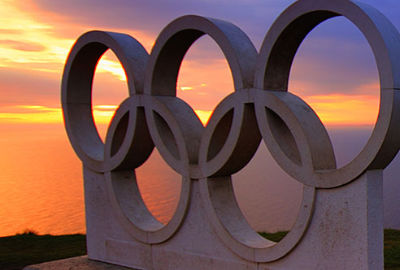 2021-10-07
2021-10-07

5 Surprising Facts In The History Of The Olympics
- ArticlesandContent.com (CIRCA 2005)
- /
- Oct 8, 2021 (written 2005)
The history of the Olympics clearly reveals how much the event has changed over the course of time.
The history of the Olympics reveals that the earliest beginnings of this special event are shrouded in myth, legend, and mystery. There is no solid or definitive evidence revealing when the very first Olympic events occurred, although there are a number of theories pertaining to the commencement and evolution of the competition. The history of the Olympics clearly reveals how much the event has changed over the course of time.
01. In Ancient Greece, the Olympic events superseded all other events going on between city-states.
When the ancient Olympics too place, there were competitions set between different kingdoms and city-states in ancient Greece. These competitions consisted of chariot racing competitions, combat, and other competitive games. The Olympics were so important that any ongoing struggles between kingdoms or city-states were halted until the conclusion of the Olympic games. The possible reason why the Olympic competitions were so revered could be linked to the legends and myths associated with the beginning of Olympic gaming. Some myths assert that Hercules was the creator of the games and that it is he would argued that gaming competitions should occur every four years. Other myths suggest that the god Zeus created the Olympic games. Additional myths assert that once Hercules had accomplished the task of making it through the twelve labors, he later built an Olympic stadium to honor his father the god Zeus.
02. The early Olympic games are surrounded in legends and myths.
No one knows the actual date that the Olympics first began, but the earliest recorded date is identified as 776 BCE. As mentioned earlier, myth links the beginning of the Olympics with a the sky god Zeus and his son Hercules, a demigod. The latter date is derived from an inscription that was uncovered at Olympia; the inscription noted the various footrace winners of racing competitions. There were a variety of games played at the ancient Olympics, some of which are still played today, including wrestling, foot racing, javelin competitions, discus competitions, chariot racing, equestrian races, boxing, and jumping competitions. Greek myth asserts that it was King Mygdon of Phrygia’s son, Corebus, who was the first champion of the Olympic games. Corebus, according to myth, was in love with Princess Cassandra and assisted Troy in the Trojan War.
03. When the Romans conquered Greece, Olympic gaming and events were on the decline.
Olympic gaming was popular right up to the sixth and fifth centuries BCE. Once the Romans became the dominant culture and became the prominent influence within Greece, the gaming events decreased in frequency. It is estimated that the gaming stopped entirely by 393 CE when Theodosius I, the Roman Emperor, banned all pagan practices and cults. Since the Olympic games were associated with pagan rituals and rites, they too were banned. However, some historians argue that after Theodosius II demanded all Greek temples destroyed in 426 CE, is when the Olympic games ended. Once the games had ended, they were not re-established until the nineteenth century.
04.The first Olympic games were played by nude competitors.
When the games first began in 776 BCE, competitors participated in a single event, a stade or sprint. Men who ran the race did not wear clothes. The winner of the event was award a kotinos or a wreath; this wreath was made of olive branches, a tree sacred to the Athenians, and placed on the winner’s head. Females could not compete in the Olympic events and they were not permitted to observe them either; this was because the games were conducted in honor of Zeus so women were forbidden from participating in any way, except when events occurred outside the stadium.
05.The four years set between Olympic gaming events is identified as an Olympiad.
It is estimated that for a period of 1170 years the Olympic games were scheduled every four years and that they were held in Greece; the four-year time span later became identified as an Olympiad. Staring with Ephorus, a historian from ancient Greece, every four years or each Olympiad was utilized as a calendar epoch. For example, a single Olympiad would be marked as the years between 776 BCE, the estimated date of the first Olympic games, to 772 BCE. Once the Olympic games ended, they were not restarted until late in the nineteenth century. When re-interest in Olympic gaming emerged in 1896, the first year of an Olympaid was marked by the beginning of the calendar year or January 1st. Thus, in the nineteenth century the first Olympiad is from 1896 CE to 1900 CE.
Olympic Traditions
Today there are a number of Olympic traditions that were not practiced during the early Olympic games. First, women are now allowed to compete in events when in the earliest games they were not. When the ancient Greeks participated in the Olympics, only men enjoyed the competitions. The only events women could observe were the chariot races that were held in a sacred area outside of the Olympic stadium. Women, on the other hand, participated in Heraean festivals hosted in Argos; Hera was the wife of Zeus and so games were played in her honor.
The use of a flag at the Olympics was introduced in 1920 when the games were held in Antwerp, Belgium. The city hosting the events would retain the flag until the events were hosted in another city; at that time, the mayor of the hosting city would then pass on the Olympic flag to the mayor of the next hosting city when the next Olympiad occurred. The flag used in the Olympics sports five distinctly colored rings in red, black, green, yellow, and blue. The rings are cast on a background that is white. These five rings are symbolic of the world being united in the Olympic games. For more information visit http://www.olympic.org/ancient-olympic-games.



